 Petzlover
Petzlover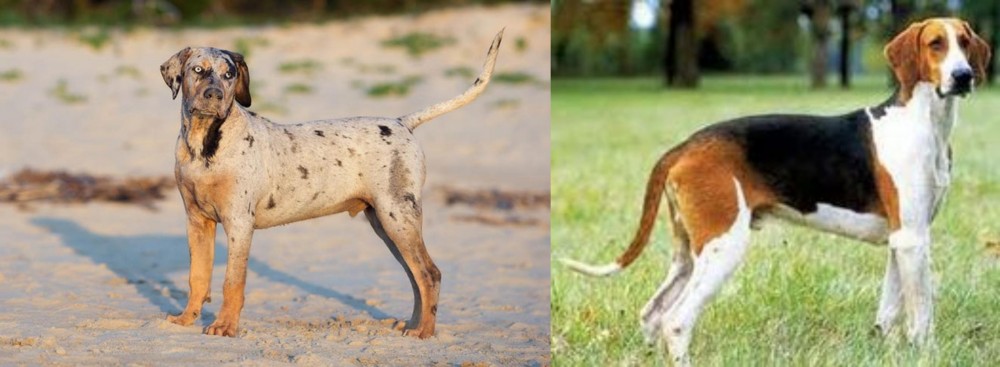 Catahoula Cur is originated from United States but Grand Anglo-Francais Tricolore is originated from France. Both Catahoula Cur and Grand Anglo-Francais Tricolore are having almost same height. Catahoula Cur may weigh 13 kg / 29 pounds more than Grand Anglo-Francais Tricolore. Both Catahoula Cur and Grand Anglo-Francais Tricolore has almost same life span. Catahoula Cur may have more litter size than Grand Anglo-Francais Tricolore. Both Catahoula Cur and Grand Anglo-Francais Tricolore requires Low Maintenance.
Catahoula Cur is originated from United States but Grand Anglo-Francais Tricolore is originated from France. Both Catahoula Cur and Grand Anglo-Francais Tricolore are having almost same height. Catahoula Cur may weigh 13 kg / 29 pounds more than Grand Anglo-Francais Tricolore. Both Catahoula Cur and Grand Anglo-Francais Tricolore has almost same life span. Catahoula Cur may have more litter size than Grand Anglo-Francais Tricolore. Both Catahoula Cur and Grand Anglo-Francais Tricolore requires Low Maintenance.
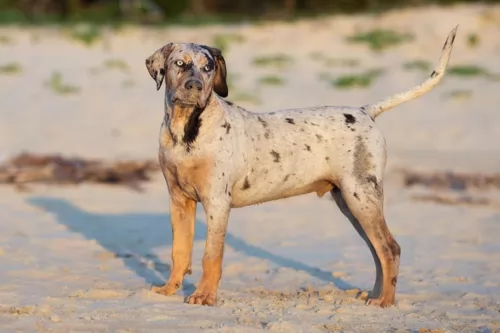 The Catahoula Cur is also known as the Catahoula Leopard Dog or the Louisiana Catahoula. The dog hails from Louisiana, United States.
The Catahoula Cur is also known as the Catahoula Leopard Dog or the Louisiana Catahoula. The dog hails from Louisiana, United States.
It is thought that the Catahoula Cur or Catahoula Hound as it is also known, used to be a hunting dog. The first settlers in Louisiana needed a strong dog to help them with hunting wild hogs and they bred their dogs with other dogs belonging to the locals. This gave them a strong, resilient dog that could take on the wild hogs and also protect their livestock.
Dogs who have no doubt been brought into the mix to produce the Catahoula Cur are mastiffs, Beaucerons, sighthounds and wolves.They are today more commonly referred to as Catahoula Leopard Dogs.
 Originating in France, the Grand Anglo-Francais Tricolore has been recognized by the United Kennel Club in 2006. He was developed in France in the 1800s.
Originating in France, the Grand Anglo-Francais Tricolore has been recognized by the United Kennel Club in 2006. He was developed in France in the 1800s.
He is a rare breed, even in France. Today he is essentially a hunting- and scentdog and isn't really kept as a companion pet. The breed is recognized in France too by the French Kennel Club and also recognized internationally in 1983. In France today the dog is bred and kept primarily as a hunting dog and pet combined.
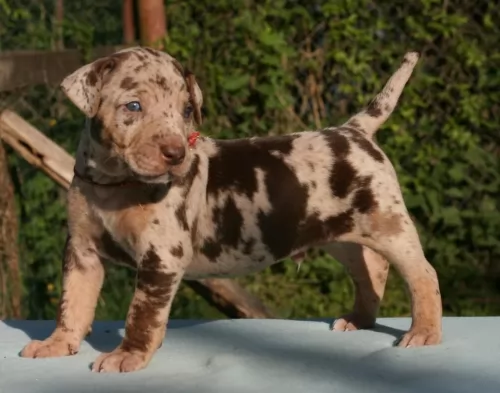 There are varying sizes for Catahoulas and a typical height is 51–66cm and weighing anything from 18 – 51kg. These Cathoula Cur’s come in different colors too, but the leopard-like coat is a dominant feature with this dog.
There are varying sizes for Catahoulas and a typical height is 51–66cm and weighing anything from 18 – 51kg. These Cathoula Cur’s come in different colors too, but the leopard-like coat is a dominant feature with this dog.
While there are solid colors, you can expect red- and blue merle, grey-, black, patchwork and brindle too.
The length of the coat varies somewhat too and while the coat is essentially short and smooth, there are Catahoulas where the coat is a little longer and more coarse.
The eyes of the Catahoula Cur are another interesting feature and both eyes can be the same color, but in some instances the one eye can be brown while the other could be blue, green or gray. The ears of the Catahoula Cur are medium in size and are floppy, dropping down close to the head.
The Catahoula Cur is an intelligent dog and also active and full of sports. You can’t call this dog aggressive, but merely assertive, being strong-willed. He is also affectionate and loyal, loving to spend time with his human family.
He makes a wonderful family pet, complete with children as well as other pets in the home, more so when he has been trained and socialized. These dogs are bright and alert and they also make excellent watch dogs. People who have owned a Catahoula Cur will tell you that these are wonderful pets, full of life and personality.
 Looking quite a bit like its Foxhound ancestors,the muscular Grand Anglo-Francais Tricolore is a large dog standing at 60cm to 70cm tall at the withers and weighing in the region of 30kg and 35kg.
Looking quite a bit like its Foxhound ancestors,the muscular Grand Anglo-Francais Tricolore is a large dog standing at 60cm to 70cm tall at the withers and weighing in the region of 30kg and 35kg.
The Tricolore has a fairly broad, flat head, black nose and large brown eyes. His ears are set at eye level, they are medium length and floppy. The legs of the dog are straight and strong and the chest is deep and broad. The tail is long and slim. His double coat coat is short and smooth and he is tri-colored – tan, white and black.
Your Grand Anglo-Francais Tricolore has always been used as a hunting dog and scenthound and has been used in a hunting team. The dog has been created by crossing French scenthounds with English Foxhounds, with this particular dog being descended from crosses between the Foxhound and the tricoloured Poitevins.
There are actually 3 Grand Anglo-Français breeds, with this Grand Anglo-Français Tricolore being one. He is a docile dog and doesn't make a particularly good watchdog. The dog enjoys the company of other canines and while he can get on well with his human family, and is good and patient with children, he isn't the ideal pet with children, as his mind is on hunting and the chase and following exciting scents.
He is a dog totally dedicated to hunting and hunting in packs sees him getting on well in the presence of other dogs. His strong hunting instinct and his wish to roam on a scent makes it that he will require a very large garden.
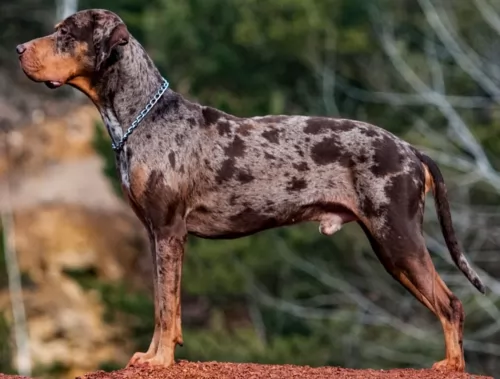 Catahoula dogs are the kind of dogs that make perfect family pets as they are all rounders. They’ve got characteristics that everybody wants in a dog. They are naturally protective, even they are not described as aggressive dogs. With training and socialization they get on well with children as well as other pets in the home. He is alert and territorial, which makes him a good watchdog, more so because he doesn’t particularly like strangers.
Catahoula dogs are the kind of dogs that make perfect family pets as they are all rounders. They’ve got characteristics that everybody wants in a dog. They are naturally protective, even they are not described as aggressive dogs. With training and socialization they get on well with children as well as other pets in the home. He is alert and territorial, which makes him a good watchdog, more so because he doesn’t particularly like strangers.
Intelligent and independent, training makes him wonderfully obedient and relaxed. However, give him the chance for ball games and a walk, and he is more than ready.
He is used to being a guard- and hunting dog, and this makes him an active, energetic dog. You will need to give him plenty of activities if you don’t want this amicable dog becoming anxious, frustrated and destructive.
Exercise him well, provide him with nourishing, top quality food together with fresh water and shower him with the love and attention he deserves as a family member. You’ll also join the ranks of Catahoula Cur owners who want to tell others about what an awesome pet he makes.
 The Tricolore is an excellent hunter but he also makes a good family pet. Because of the dog having ingrained hunting skills you won't find him being used essentially as a pet.
The Tricolore is an excellent hunter but he also makes a good family pet. Because of the dog having ingrained hunting skills you won't find him being used essentially as a pet.
He can be stubborn, but with training and socialization he can become obedient and amicable. He is a dog that will require a great deal of exercise as he is an exuberant dog and won't do well in an environment where there is scant regard to outdoor living and exercise.
While hunting is a great love of this tri-colored dog, he is also capable of being a loving and devoted pet.
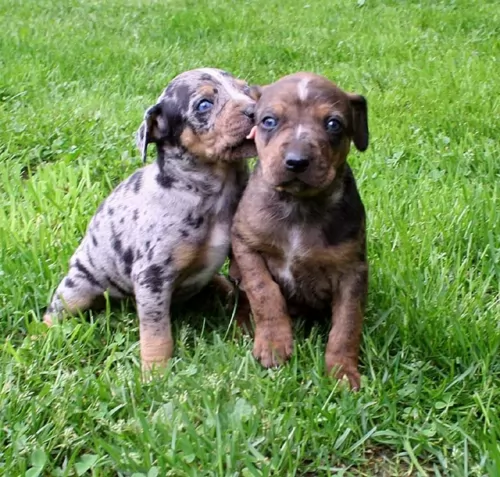 When you buy a Catahoula Cur, you can know that your pet is going to be fairly healthy, however there will be some common health issues to look out for, and by knowing about these health concerns, you can be better prepared.
When you buy a Catahoula Cur, you can know that your pet is going to be fairly healthy, however there will be some common health issues to look out for, and by knowing about these health concerns, you can be better prepared.
Your Catahoula Cur will be susceptible to some bacterial and viral infections which can be life threatening for him if he gets them. Some of these are parvo, distemper and rabies. That is why it is important to have your pet vaccinated, which can start at about 8 weeks of age for a puppy.
Obesity is a world-wide problem with humans and with their pets and it can open up a whole lot of problems with your pet’s health that he otherwise might not have got. It can play havoc with your pet’s digestion, and it can cause joint problems too.
It can be so tempting to pop a sweet treat into your pet’s mouth because you love him so much, but get to know what foods can actually be hazardous for him.
 Living to be about 10-13 years of age, your Grand Anglo-Français Tricolore is fortunate to be a healthy dog, but just like many other dogs, he may well get sick and then, as a responsible dog owner, you need to get your 4-legged family member to the vet.
Living to be about 10-13 years of age, your Grand Anglo-Français Tricolore is fortunate to be a healthy dog, but just like many other dogs, he may well get sick and then, as a responsible dog owner, you need to get your 4-legged family member to the vet.
An abnormal hip joint can be hard for your dog as you notice him becoming less active and battling to get up after lying down. Hip dysplasia can lead to osteoarthritis, a limp and lameness. Get him to the vet so that you can at least help with making your pet's problem easier to bear.
Typically with deep chested dogs, the Grand Anglo-Français Tricolore can develop the life-threatening problem of bloat, when the stomach twists.
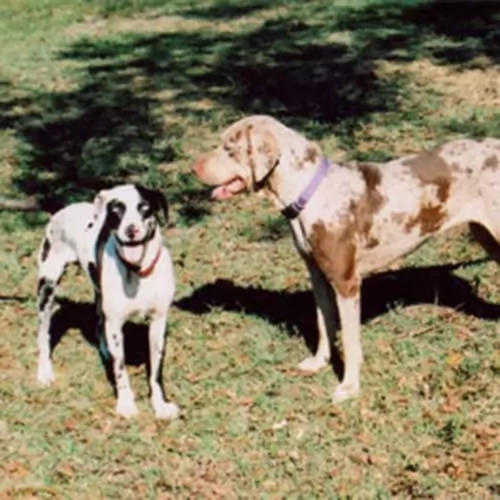 Your Catahoula Cur isn’t a high maintenance dog and a good brushing 2 times a week will keep his leopard coat looking shiny and free of loose hairs.
Your Catahoula Cur isn’t a high maintenance dog and a good brushing 2 times a week will keep his leopard coat looking shiny and free of loose hairs.
Catahoula’s have good teeth, and you want to keep them that way by brushing them at least 2 or 3 times a week to prevent dental decay and a host of other medical issues.
 The exercise requirements of this breed are high and he thrives on being busy and being involved in a hunt. If you do happen to keep him as a pet, he will require plenty of intense exercise from going on walks to joining in with your jogging and cycling activities. He just never seems to get enough exercise.
The exercise requirements of this breed are high and he thrives on being busy and being involved in a hunt. If you do happen to keep him as a pet, he will require plenty of intense exercise from going on walks to joining in with your jogging and cycling activities. He just never seems to get enough exercise.
The Grand Anglo-Français Tricolore requires little grooming and will do well with a good brushing twice a week to remove loose hairs.
For your Grand Anglo-Français Tricolore to be strong and healthy, he'll need protein for strong bones and muscles.Protein needs to be the primary ingredient in an active dog's diet. If you're not sure, ask your vet about the best kibble to feed him and add in some raw meat to this every now and then.
Where possible, cooked brown rice, vegetables and chicken can be added into the kibble too to make his diet more interesting and healthy. Fresh, cool water should be reachable for your dog 24/7.